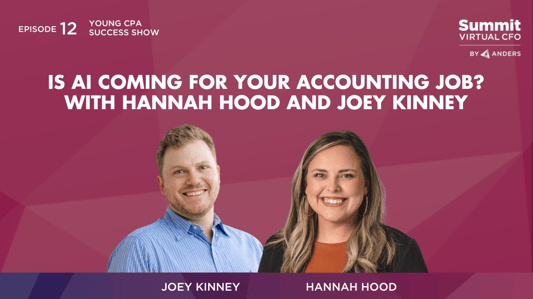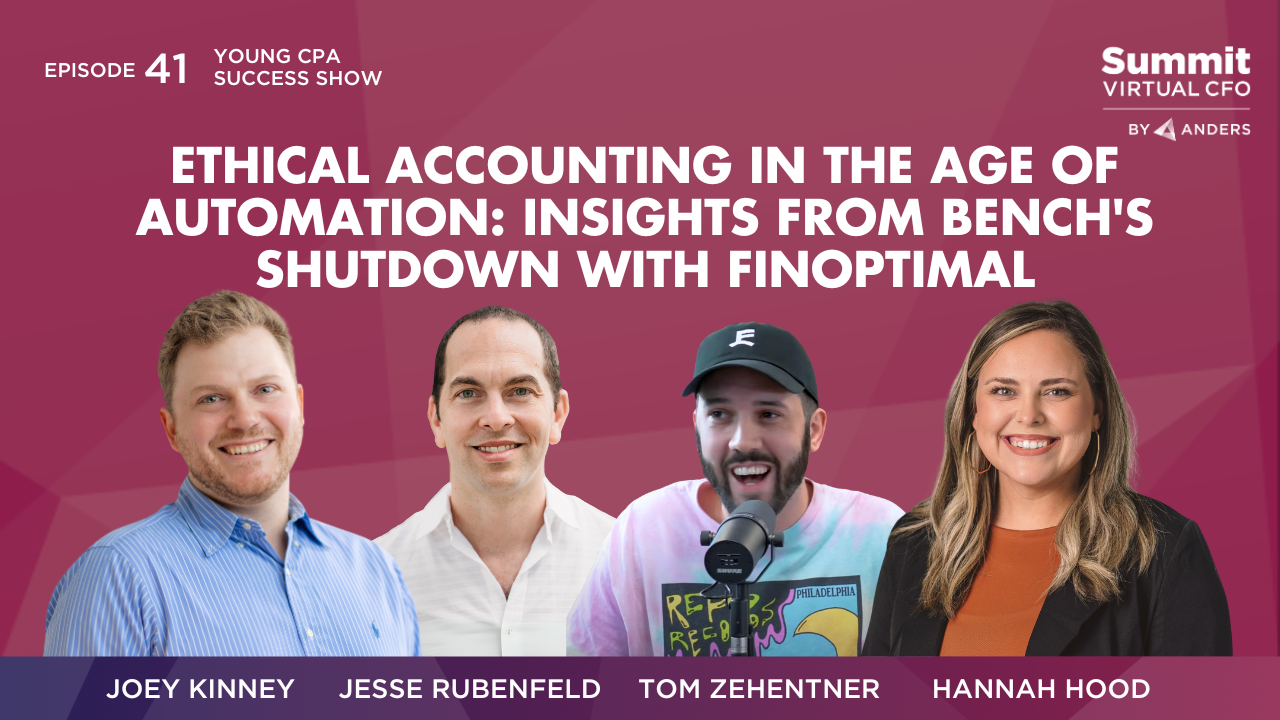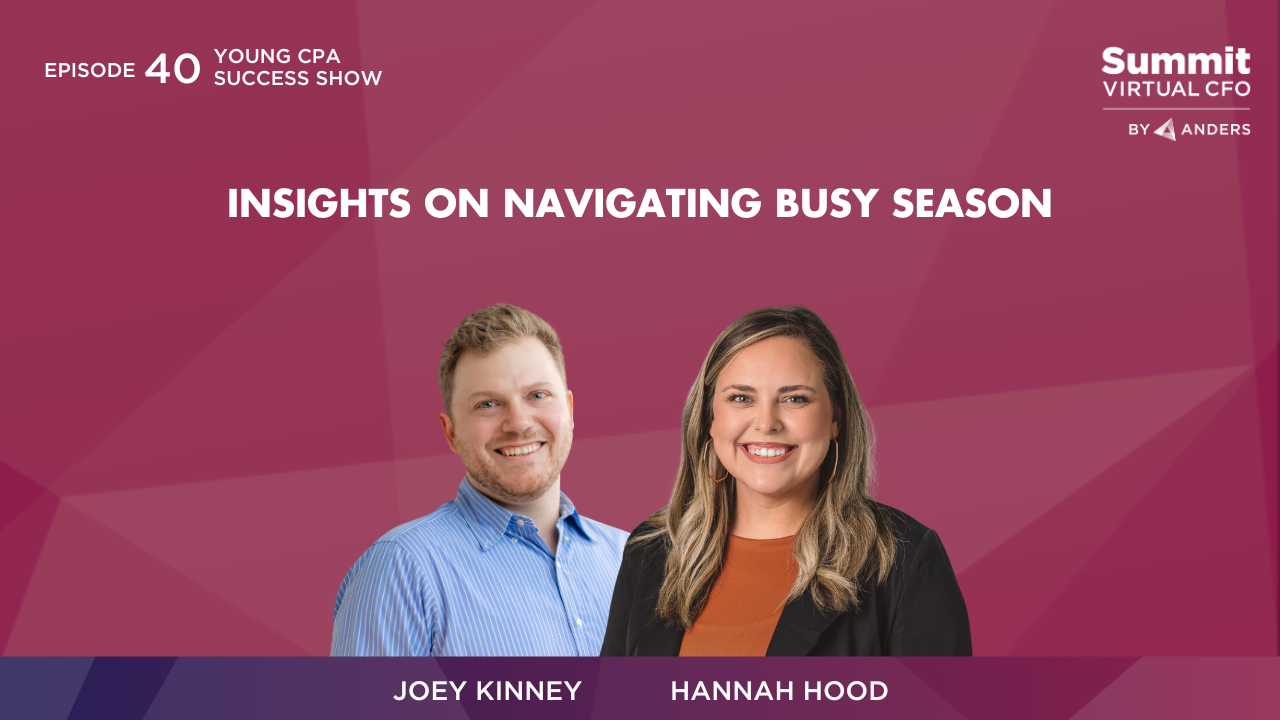The Young CPA Success Show: Episode 12
In this host-on-host interview, Joey and Hannah examine the impact of AI on the future of the accounting industry. They explore how AI might automate technical skills, shifting the focus toward personal and professional development. Lastly, they discuss the importance of soft skills, which AI cannot replace. Will AI replace accountants or present growth opportunities? Listen to find out!
Intro (00:00:00) - Welcome to the young CPA Success Show. If you're a young accounting professional, this podcast is your ultimate guide to navigating your early career. Join us as we share valuable insights, expert advice, and practical tips to help you kickstart your path to success and excel in the accounting industry. Let's embark on this exciting accounting journey together.
Joey (00:00:23) - Hey, Hannah.
Hannah (00:00:24) - Hey, Joey.
Joey (00:00:26) - How are you this morning?
Hannah (00:00:27) - I'm doing well. How are you?
Joey (00:00:30) - I'm good. So, we're doing a little format podcast today. We're going to react to some news, something that we both read and have both been thinking a lot about. But before we do that, talk to me about the coffee situation at your house.
Hannah (00:00:44) - Listen, I am the only one in my house who drinks coffee, so I get to be as specific as I want to be, as creative as I want to be, and have to pay no mind to what anybody else wants in my house. So, my coffee of choice and what's in my cup this morning is I always reach for Cafe Bustelo.
Hannah (00:01:03) - It is my espresso style coffee of choice. Every day I make it with half and half stevia. And this morning I got a little wild and put some hazelnut skinny syrup in my coffee. So, I'm living life on the wild side this Friday.
Joey (00:01:23) - Oh, so you're just you're just leaning all in to the August vibe, which I said this the other day to someone. I don't know if they believed it, but it's like August is for getting ready for fall.
Hannah (00:01:31) - Yes, got my fall decorations out last weekend, so feel like I'm very much leaning into we are we are. A fall is upon us. That's what I'm doing. I'm willing fall upon us here in the South.
Joey (00:01:45) - At least we had like that nice little. When I went on my run this morning, it was like a nice little. There was just that little hint of the crispness.
Hannah (00:01:53) - I love it, it's my favorite.
Joey (00:01:55) - Which, you know, as a bigger dude, you know, I do enjoy, you know, that Christmas in the air because it's like, man, I'm not going to be hot.
Joey (00:02:05) - Time in like three months.
Hannah (00:02:06) - So what's in your cup, Joey?
Joey (00:02:09) - So first off, I'm in my fancy mug. Shout out to my wife, who is like.
Hannah (00:02:14) - I like your fancy mug.
Joey (00:02:15) - Of all things home decor in our household. And she found this at like a farmer's market here in Albuquerque. And just for.
Hannah (00:02:22) - Oh that’s so fun.
Joey (00:02:23) - My fancy mug when I feel like drinking fancy coffee. So, this is I go pretty, pretty simple on the coffee. I don't like a ton of stuff with it. This is just black coffee. Kind of a light to medium roast. We do two things on the coffee situation. Here we are. We are avid bean box subscribers, so we have a bean box that comes. We have gone through our bean box that is on its way to us. So, we don't have any fresh samples from other places. So, this is my go to local coffee from Coffee in Albuquerque. Shout out to you. Poor guy goes, this is not a sponsored thing.
Joey (00:02:53) - I'm just a fan. What he does is he every quarter does a like a brand new blend. So, he's got a spring blend, a summer blend, a fall blend, and a winter blend that he changes with the seasons. It's all roasted in house and it's about a mile away from from where I live from this office right here.
Hannah (00:03:14) - Love that. And first of all, I feel like I need more information on this bean box. Didn't know there was such a thing. So you're going to have to get me a link. Joey, you've influenced.
Joey (00:03:23) - We can get you. We can get you a link to the bean box. And what it is, is it's a subscription coffee service. They send, like, a little, like, I don't know, three, four cup sample packs of, like, you know, from all over the country. You can probably get some from all over the world. You choose what style you like. So, if you like a light or a medium or a dark roast, you can kind of tweak your palate from that perspective and they just send you fun samples.
Joey (00:03:45) - It's really cool.
Hannah (00:03:46) - That's really awesome, I love it.
Joey (00:03:49) - Well, let's dive into our, our topic for the day. And I'm going to start by asking you a question first.
Hannah (00:03:55) - Before you ask this question, let me preface this to our audience. Joey and I also coming into these shorts are not having a conversation ahead of this. This is for our audience as genuinely just having a conversation about this topic in terms of what comes top of mind for us, what we've seen are experiences, who we've talked to and just sharing that with all of you. So, this is truly kind of like a blind react, like, hey, like we have between us determined what the topic is going to be. But then in terms of the actual meat of the subject, no conversation around it. So.
Joey (00:04:37) - Without further ado, here we go. Hannah, as I come in for my job.
Hannah (00:04:44) - I think that a lot of us could get really scared about AI. Based on everything that we hear about its potential, for sure.
Hannah (00:04:54) - And I think that it's probably natural for us to, like, feel a little bit of fear whenever we think about AI and the potential that it has, because, I mean, there's some things that I've heard that I could do and the potential, what it could do that I'm like, that's kind of scary about its potential. Um, but if you're asking me, I don't think so. I don't think that I could ever replace human connection. I don't think it could ever replace that piece. And that value, especially for us as we as we lean into what we do for our clients. However, what I think it will do for us is automate more of the technical skills of what we do as accountants. So, we're going to have to lean harder into our own internal skills and developing ourselves personally and professionally in ways that we probably haven't had to really worry about before up to this point. What's your take on it?
Joey (00:05:56) - So I don't know if you remember this. It's been about a decade, but there was a moment where IBM this was in like 2010, 2011, they were working on getting their computer Watson on Jeopardy! Do you remember that?
Hannah (00:06:10) - I do remember that, yes.
Joey (00:06:12) - So when that was going on, I was in an accounting class at Kansas State University, and it was like it was like the higher level, like capstone theory based accounting class with a guy named Dan Dinesh. Shout out to you, Dan you were fantastic. But in that class, we had to give a speech about something that was going to change the accounting industry. And I wrote about Watson because I was thinking about it from an audit perspective. The way audits are done, you're going to sit there and you're going to go and do testing, right? You're going to say, we have 100 transactions, we're going to test ten of them, we're going to get a representative sample, and we're just going to test this because the theory has been there's absolutely no way a human is going to be able to test all of these different things. So we have to take a sample. It's the only way it's going to work.
Joey (00:06:58) - And what I wrote about was machine learning and AI and how even a decade ago, it was starting to transform things. Because if you can get an AI or human machine learning type thing to start learning about connections, learning how to do the vouching and those types of things that you do in an audit, you can now expand your sample size and feel quite a bit better about the results of your audit. But to your point. What the computer is not going to be able to tell you is what the what the results of that sampling means. If we get to that point, we've got much bigger problems than you and I losing our jobs, because we've probably had an AI machine that's passed the Turing test, and there's all the sci fi that you could possibly see that's going to tell you the bad things that could potentially come from that. And that's a whole different rabbit hole for a whole different podcast. But to your point where I think this is going to change is the lowest, I don't want to say the lowest level, but like the on the pyramid of functions, right? You're transactional based functions and an accounting system.
Joey (00:08:01) - So many more of those are going to be pushed to machines where those younger people who are coming up, the entry level type jobs are going to be less. Do you know how to do a rev rec and more? Do you know how to program your AI so that they can give you the rev rec, or give you the bank rec, or give you any type of like function that you're doing? And the rub on that is that you are going to have to learn how to interpret those skills and interpret those results and figure out what they mean. And then to your point, communicate it up the chain to your superiors.
Hannah (00:08:38) - Absolutely. I think saw an article floating around where I had essentially taken the CPA exam. Think in the first iteration it had not passed the CPA exam, but I'm almost certain I saw that there was an iteration of AI that had passed the CPA exam and so was like, that is really wild, that that's the point that we've gotten to with AI. It also made me think to, in terms of how we actually implement AI and the effects that it has on our industry and on our daily in our in our daily lives, and especially for people who are in the tax industry, like, could we be it? Could we be on the horizon of a busy season that isn't 60 plus hours a week? By implementing AI and then having hope? So, you know, like what? Feel like that.
Hannah (00:09:27) - That is all that's a possibility. And I know we had a really awesome conversation yesterday with Robert Minkler. And just even for me as a female in the season of raising my kids, how those hours for me like walked away from the industry for, for multiple reasons. But one of the reasons being is I couldn't commit those kind of hours whenever my husband's a teacher and a coach and he's gone for I'm essentially single mom in football and baseball season. So, you know, I just couldn't commit that kind of hours in a busy season. So that really played a role in the trajectory of my career up to this point. So, I could benefit us in a positive way in that regard? I hope so. I hope that's where we're headed with this and that. People are embracing the automated piece of what I could bring, bring in the industry.
Joey (00:10:23) - Yeah, it's it's I think just like anything else, it's going it's going to enhance the value that CPAs can, can provide.
Joey (00:10:31) - And it doesn't surprise me that an AI was able to pass the CPA exam, because a lot of what I remember from the CPA exam is it's a lot of can you remember the information, can you remember the steps? And I know they've been working on adjusting the CPA exam to try to get it to be a little bit more analytical in nature? I know those changes are coming. I don't think they're there yet.
Hannah (00:10:51) - I think they're changing as of next year for a lot of that reason. So yeah, it's definitely coming.
Joey (00:10:58) - Right. And that's the type of thing where to your point, I think there's two things that you mentioned are that is not going to be able to replicate. It's not going to be able to replicate human connection. And I think it's still we're a long ways away from being able to maybe make a lot more of the cognitive type connections that humans make there. AI is really, really good at forward computation stuff, like that's why, you know, for it's been 50 years since the first computer beat a human in chess, but it's because the computational power of a computer was able to run all the scenarios in a way that a human couldn't in that regard, in faster and more and more real time.
Joey (00:11:37) - The thing that I think is going to be really important for young CPAs, as you're starting to come out when you're if you're in college and you're starting to think about what you want to do with your career, or if you're young and your career and you're starting to figure out, like you need to know what skills to have, start working really, really, really hard on your soft skills. Work on your storytelling, work on your presentation, work on, you know, human connection and building connections with coworkers and clients. And we've got a book that we read that was all given to us. This is the Soft skills book by our friend Dan White. So, we're going to post a link in the bio, by the way, to a great interview that we did on the virtual CPA Success Show. One of our other podcasts here that we that we have in the in the Ander’s House, and we talked with Dan a few months ago and think it's been it's been out for a few months, but it was really enlightening to hear.
Joey (00:12:29) - Well, first off, he was a really nice guy. We really enjoyed the conversation, but secondly, it was great to hear him talk about how he envisions his book being used practically by people. He's like, I wanted to just be a guide. Like, if you don't know how to start off a presentation or you don't know how to do a certain thing that you need and you need some help with the soft skills, it's right there in the book for you to take a look at. And that's one that I just highly, highly recommend. Everybody check out and add to your tool belt of resources.
Hannah (00:12:59) - I love that. And soft skills will never, ever steer you wrong in terms of the time that you spend on developing those. And for some people, for me, I always felt like it was very easy, like it was just very natural, feel very fulfilled in in leaning into relationships and learning more about that and how I can be better at that. But I'll also know plenty of people where that is not their comfort level in terms of leaning into that and learning more about that, that is.
Hannah (00:13:27) - But it would be what Rob, you might have to cut this. I can't think of the word I was trying to try and behoove you. Yes, that's what I'm trying to say. Behoove you do want to spend intentional time learning about these soft skills, and it's going to.
Hannah (00:13:51) - Okay. Sorry. Okay. Okay. Okay, okay. Okay. Okay, so let's start over from that again. Where would be a good place for me to start. Let me think of where was going with that.
Joey (00:14:12) - So you were saying that soft skills will never serve you wrong?
Hannah (00:14:14) - Yeah. Okay. So was saying starting from here. I really love that Joey going into talking more about those soft skills. I know for some people that is very natural. It's just leaning in and just working a muscle that some people already have. Some people don't naturally have that muscle, so you've got to put in some intentional work into learning more about those soft skills, developing those soft skills, and you've got to lean into getting uncomfortable.
Hannah (00:14:43) - It's probably going to be uncomfortable to flex and use that muscle that those soft skills require you to use and to practice. And that's okay. And there's going to be times throughout your career, even if you are an expert and a pro at soft skills times in your career where it's still going to be uncomfortable and you're still going to have to learn and to grow through those uncomfortable situations. But you again, got to be intentional about doing that and the introduction of AI and the potential where our industry is going as a result of that really, really leans hard on us, taking the time and intentionality of doing that.
Joey (00:15:26) - You know, I saw something the other day that really resonates with that. And it was I can't remember if it was a LinkedIn post or something. It was something, something on social media where it says the first time you do anything is not going to be any good, but you can't have 100 times until you have a first time. So, it's never too early, like you said, to start working on that.
Joey (00:15:44) - And I mean, I didn't have any soft skills until college. I had to go to Kansas State, which was. Thousand miles away from home, and I knew absolutely no think I knew two people in the entire university when I went there. And, you know, you start picking up stuff pretty quickly because you have to. I'm not saying everybody has to do something that drastic, like move 1000 miles away from home, but it you can never you just the best time to start learning how to do this was yesterday and the second best time is today. So, you know I like what you said. Lean into it, be okay with the uncomfortableness and know that with that growth mindset, like if you fail the first time, that's okay because you're not going to fail on your 100th time. Everybody fails on their first time.
Hannah (00:16:27) - Absolutely. And in that, think you'll find people along your career who will mentor you in this regard to who you can look to. I can think of people all throughout my career that I've looked to like.
Hannah (00:16:38) - I've watched and just observed how they interact with people, just how they interact with their coworkers, just in general that I've taken so much just from observation of people who do it well, that I can then apply and make it my own and really, really own it for myself and take that with me all throughout my career. So definitely, as you're starting in your career, look for those people. It doesn't even have to be necessarily somebody that you reach out to and say, hey, will you be my mentor? Like even though think that would be a really amazing I think it's also okay to just find people. Maybe it's via a podcast, maybe it's on TikTok, you know, maybe it's through social media, whatever that is. But just observe what they're doing and make it your own. I think that's another great way that you can lean into your soft skills and develop your soft skills as well as, like you said, books like that's such a great, such a great resource.
Hannah (00:17:34) - And you just you just gave us a really great one to be able to take that into our own hands and learn from it.
Joey (00:17:41) - So to recap, Hannah, what I think that we've gotten to today is that AI is not going to take away our jobs, but it's certainly going to change our jobs moving forward. Absolutely. And there's certainly some opportunities here for young CPAs in particular, to stand out from there, from their peers if they wanted to, to kind of lean into certain things. There's resources out there. There's lots of stuff that's available. Um, and that's a great opportunity for that young CPA to kind of grow in their career outside of just the transactional nature of the work. That's going to be more the future than what it is currently.
Hannah (00:18:21) - Yeah, absolutely.
Joey (00:18:23) - Cool. While moving forward, we're hoping to do so many more of these in the future. So, if you have any topics that you'd like us to talk about, go ahead and shoot us a response at the at the social media platform of your choice.
Joey (00:18:34) - Whether it's Instagram, Twitter, LinkedIn, you can find us there. You can send emails to our email address at Young CPA Success Show at anderscpa.com. We're going to have a link to this book in the bio so that you can see that there. We're also going to have a link to the podcast where we talk to Dan in the bio because he was fantastic and we had a wonderful conversation with him. Hannah, thank you so much for bringing the wonderful topic to the to the chat today. Enjoy the rest of your cup of coffee and we're looking forward to catch you all next time!
Hannah (00:19:02) - Awesome! See you later!
Outro (00:19:05) - If you're a young CPA looking to develop in their careers, we're always looking for great people. Visit our website for remote work opportunities with Summit Virtual CFO, or find all our open positions at Andrews CPAs and advisors.

.png?width=120&height=77&name=Summit-Virtual-CFO_color_rgb%20(1).png)












